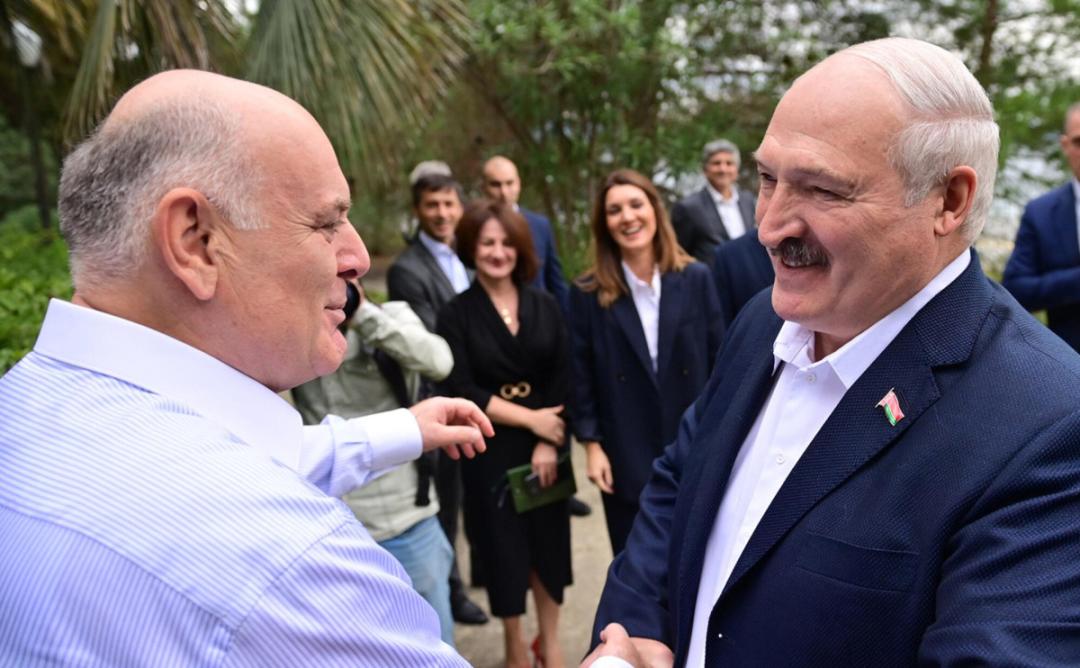
Ruptures in Georgia-Belarus Relations

Minsk might be reconsidering its stance on Georgia’s separatist territories. With the war in Ukraine accelerating existing divisions in Eurasia and Russia demanding absolute solidarity from its allies, Lukashenko might be pushed to abandon his neutral position on separatist regions.
On September 28th Belarusian president Aleksandr Lukashenko paid a surprise visit to Abkhazia, the separatist region of Georgia which has effectively been under Russian military control since the invasion of the 2008 war.
The visit angered the Georgian government. Though it was, as Lukashenko said himself, only an informal visit, Tbilisi’s policy of limiting the spread of recognition of Abkhazia seemed to be under threat. This was all the more surprising as Georgia and Belarus shared stable and even friendly ties. Trade relations developed, as did the cooperation between security agencies. Russia’s factor was minimized – both sides understood that there was no need to complicate bilateral relations. Red lines, such as Georgia’s territorial integrity, remained uncrossed. Similarly, Tbilisi’s position toward the post-election protests and crackdowns in Belarus in 2020 was neutral.
This mutual understanding was based on earlier positive trends in Belarus-Georgia relations. Belarus opened its embassy in Georgia in 2016 after Lukashenko's first official visit a year earlier. In 2017, the then-chairman of the Georgian parliament paid a visit to Minsk. In 2018, a second visit followed, and some 60 small-scale agreements, including on economic cooperation, were signed. A road leading to Belarusian small businesses was opened in Georgia.
The rationale for Georgia was to avoid the spread of recognition of Abkhazia and the Tskhinvali Region by states other than Russia. For Belarus, on the other hand, flirting with Georgia was a way to reach out to the West. This was a period when the Belarusian president engaged in a diplomatic campaign to improve his ties with the European Union. Georgia, the West’s major partner in the wider Black Sea region, seemed like the right choice for Minsk.
Much has happened since then. The internal situation in Belarus deteriorated, and its dependence on Russia hardened. This leaves little space for Minsk to maneuver. The time for geopolitical games has ended, and with Russia now stuck in Ukraine, Putin demands absolute loyalty, which means that Minsk might be reconsidering its position on close relations with Georgia and especially the issue of recognition of the separatist territories.
What exactly Lukashenko had in mind while visiting Abkhazia is unclear. He spoke in veiled terms: “We want to build not just a bridge of friendship but very serious relations,” he told Aslan Bzhania, the separatist leader. Tbilisi’s reaction was quick. The country’s Ministry of Foreign Affairs summoned the Belarussian ambassador and expressed concerns, demanding additional clarifications from the Belarussian side.
Lukashenko’s statements could signal a coming change in Belarus’ policy toward separatist regions. Minsk might finally be siding with Moscow on all sensitive issues; it has so far managed to maintain a balance. Yet, it is not the first time he made suggestive statements about Abkhazia. For instance, just before Russia invaded Ukraine in February, he hinted that Minsk might be recognizing the independence of Abkhazia and Tskhinvali/South Ossetia, another separatist region of Georgia. Lukashenko might have played a messenger’s role for Putin, whom he met just before the visit to Abkhazia, to relay Moscow’s willingness to support the region more if it agrees to some sensitive demands from the Kremlin.
Lukashenko’s visit and the topics discussed with the Abkhaz leader also cannot be decoupled from Abkhazia-Russia dynamics. Abkhazia’s separatist leadership has yet to officially agree to transfer the 186-hectare (460 acre) Bichvinta (Pitsunda) estate where Soviet leaders once spent their summers, and its resort seafront, to the Russian side. The likely decision would be part of an agreement confidentially negotiated in early 2022 between the Kremlin and local leaders, which in turn builds upon the 2020 program aiming at harmonizing the Abkhaz-Russian relationship. In reality, the deal paves the way for the breakaway region’s de facto annexation.
Thus, Lukashenko’s visit might be part of a carefully-crafted Russian campaign to persuade Abkhazia to transfer the Bichvinta resort to Moscow. But it also might signal a change in Belarus’ foreign policy – Minsk could abandon its long-held policy of non-recognition of separatist regions. This potential scenario would be impossible without the effects that the war in Ukraine has had on Eurasia. The invasion causes major geopolitical re-alignment. As Russia’s fortunes in Ukraine turn increasingly grim, its allies such as Belarus and Abkhazia have more limited options for maneuver. Indeed, a further indication of the change of thinking in Minsk might be a November 1 visit by a team from the Parliamentary Assembly of the Union of Belarus and Russia to Abkhazia. One possibility could be that Abkhazia might be offered to join a Belarus-Russia Union State.
Beyond a possible diplomatic rupture, however, Belarus and Georgia have very little to lose economically if bilateral ties worsen. For instance, according to the National Statistics Office of Georgia (Geostat), in 2021, Belarusian investment in Georgia was roughly $1.3 million. The First half of 2022 saw a bit greater Belarusian engagement ($1.825 million). Yet the numbers are meager and as the trend of the past several years shows, the trajectory is unlikely to change. In bilateral trade relations are also not especially promising. The figures reached 85$ million in the first half of 2022. In 2021, trade turnover with Georgia amounted to $96.7 million.
Though economically the two countries will not lose much, the possible rupture in relations would, however, affect one critical sphere – security cooperation. In August 2021, Georgia’s State Security Service began cooperating with the State Security Committee of Belarus, based on the 2016 treaty. The latter covers interstate cooperation on transnational threats ranging from terrorism to human trafficking. The treaty was especially beneficial to Belarus, as Minsk could lose information on those Belarusians who left the country for Georgia after the 2020 protests and especially following the war in Ukraine.
Long-term trends signal a likely shift in Belarus’ stance on separatist regions in the wider Black Sea region. A break in bilateral relations would be detrimental to both countries, but perhaps more so to Belarus, as it would subject the country to further isolation and potentially more Western sanctions.
Emil Avdaliani is a professor at European University and the Director of Middle East Studies at the Georgian think-tank, Geocase.
See Also


3+3 Initiative as a New Order in the South Caucasus

Economic Cooperation Between Armenia and Georgia: Potential and Challenges Ahead

Russia and Occupied Abkhazia: A New Type of Relations

Georgia and US: From Close Ties to Caution

